In many ways, marketing leadership has never been harder.
Over the past year alone, you’ve needed to navigate economic turmoil; a workplace shift to more globally distributed teams; and new trends that felt like they arose overnight (TikTok, anyone?).
Which is why 76% of marketing leaders say marketing has seen more change in the past three years than the last 50.
Change isn’t always bad, but it is always challenging. And, as we prepare for the year ahead, many marketing leaders are wondering: What should I prepare for? Where should I focus my efforts? And what are my biggest blind spots?
To help you create a powerful and agile strategy for 2023, we’ve surveyed 500+ marketing executives on the biggest challenges, opportunities, and trends ahead of us. Plus, we’ve interviewed some of the biggest experts across the industry — ranging from CMOs and VPs at LinkedIn, Uber, Microsoft, Dropbox, SEMRush, and more — to uncover best practices for becoming a better, more effective leader.
If you’re not a marketing leader, but interested in becoming one, you’re in luck. We also have plenty of content and best practices on getting ahead in your career — including how to get executive stakeholder buy-in, and how to get promoted on both an individual contributor and manager-level.
Let’s dive in. 
Executive Leadership Survey Results [Top Findings You Need to Know About + Expert Insights]
1. The biggest challenges marketing leaders’ expect to face in 2023 include generating revenue, securing budget, and improving sales-marketing alignment.
When asked which challenges marketing leaders’ expect to face in 2023, 14% said generating revenue and securing the budget they need are tied as the top challenge they believe they’ll face.
Both of these concerns stem from the possibility of an upcoming recession. When asked how marketing leaders would respond if a recession were to occur, 30% of marketing leaders say they would respond by increasing their marketing budget, while 1 in 4 plan to reduce their budget in an economic slowdown.
Other top challenges marketing leaders expect to face include:
- Improving sales-marketing alignment (13%)
- Having to pivot your marketing strategy due to major events, e.g. recession, pandemic, political turmoil (13%)
- Facing increased competition from other brands (12%)
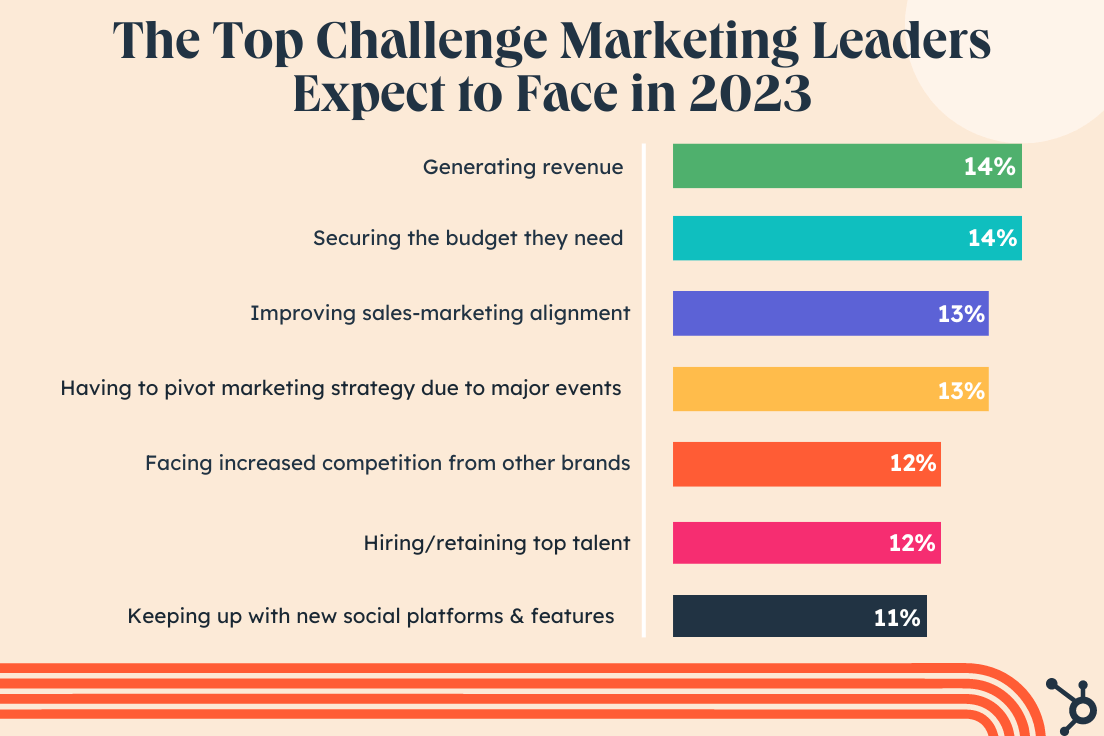
Additionally, we surveyed marketing executives in our Marketing Trends report earlier this year, and 14% of marketing leaders say they anticipate ‘adopting a data-driven marketing strategy’ to be a top anticipated challenge of theirs in 2023. While this isn’t a top challenge in our Executive Leadership report, it’s still worth pointing out as many of the experts we spoke with told us it’s a big concern of theirs.
Collecting data has gotten increasingly difficult as consumers’ become increasingly concerned with protecting their privacy. So adopting a data-driven strategy in 2023 will require marketers to ensure they’re effectively combining first-party and third-party data.
Microsoft’s Global Head of Programmatic Evangelist, Daniel Godoy, says, “Shaping your strategy by leveraging 1P or 3P trustable data becomes necessary to expand potential reach and start piloting your data strategy for the future.”

Plus, to create a powerful data-driven strategy, you’ll want to collect custom audience attributes (not just basic descriptive information), and then create dynamic prospect lists through audience segmentation. From there, you’ll want to develop unique messaging that resonates with your prospects.
ZoomInfo’s Chief Marketing Officer, Bryan Law, told me, “You’ll need to figure out how to convey your ability to alleviate their challenges in a unique way to penetrate the significant market noise. Practice consistency in your overall theme, and include contextual personalization when applicable.”
The Top Challenges Marketing Leaders Expect to Face in 2023 & How You Can Solve For Them [Expert Insights & Data]
2. Out of those that struggle with growing a global audience, 62% say it’s their biggest challenge right now.
For some context: In our Marketing Trends report, we asked 1,000+ marketers to identify the challenges they’re currently facing.
Then, we asked them to select the one challenge they struggle with the most.
And over half — 62% — told us growing a global audience is their biggest issue.
The good news? We asked Neil Patel, a New York Times bestselling author, one of the world’s most influential marketers according to the Wall Street Journal and Forbes, and co-founder of NP Digital to provide us with solutions to marketers’ biggest challenges from 2022. Take a look at the full video, below:
3. Marketing leaders agree that increasing revenue and sales is their top goal for 2023.
Increasing revenue and sales is a top priority for most marketing leaders in 2023, with 22% — or roughly one-fourth — saying it’s their number one goal.
To increase revenue, marketing leaders will want to identify areas of the customer journey that can be further optimized. For instance, perhaps you’ve observed your audience reach plateau-ing or even shrinking. To continue increasing revenue, you’ll need to consistently reach bigger pools of qualified leads. You might do this by testing out new platforms like TikTok or podcasting.
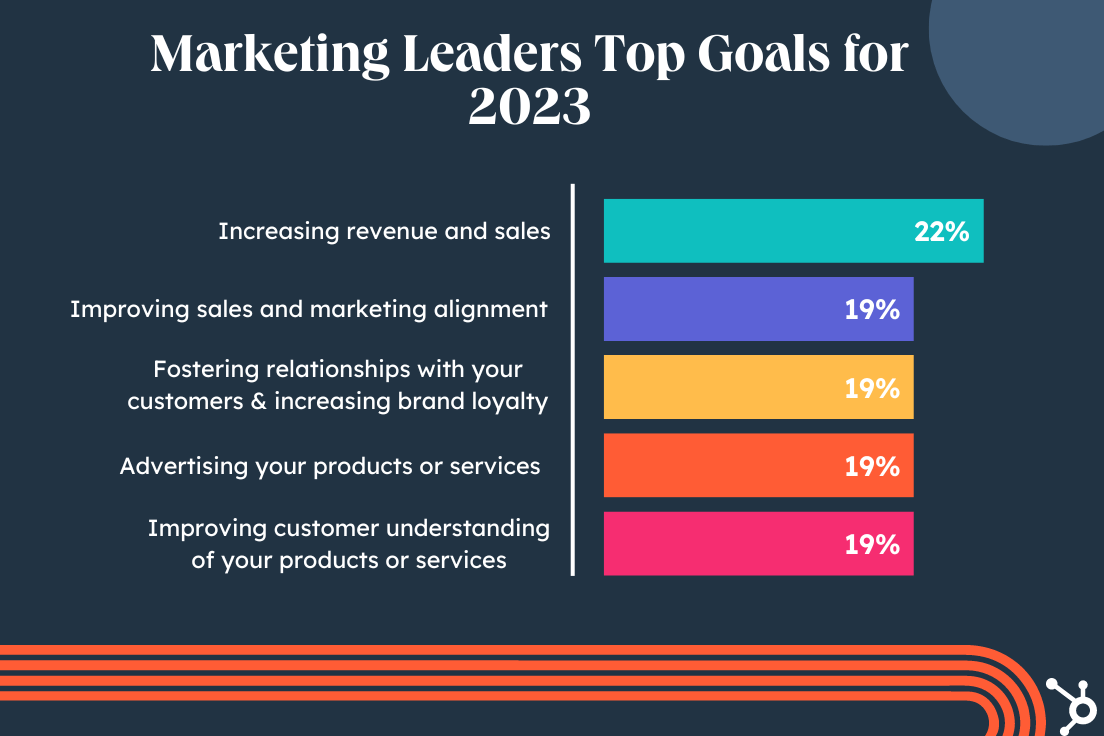
Alternatively, maybe you notice your marketing team is attracting plenty of leads, but they’re not converting at high rates. To combat this challenge, you’ll want to create stronger offers or a more effective lead generation strategy.
Gaurav Agarwal, Chief Growth Officer at ClickUp, says increasing revenue and driving sales is a top priority for his team in 2023.
He told me, “As a fast-growing company with industry-leading NDR, adding in new revenue sustainably is our top priority. We are hyper-focused on building out different growth and sales capabilities to achieve that goal. As we embark on our 2023 planning, we do so with a renewed focus on efficiency and clear goals around our different self-serve and sales-assisted motions.”
Michelle Keene, Dropbox’s Sr. Director of Global Marketing, Document Workflows, agrees that increasing revenue is a top-priority.
As she puts it, “In 2023, a year that is expected to be dominated by economic uncertainty, the shift to profitable growth [rather than growth at all costs] will only be accelerated — moving from a nice idea to a requirement.”
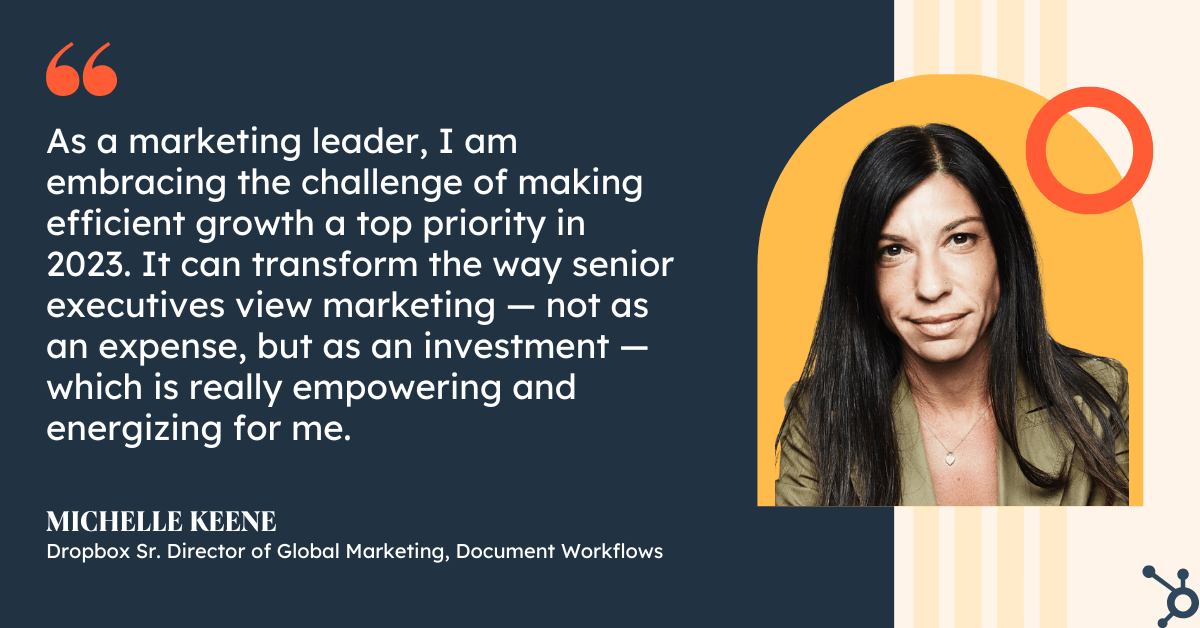
The Top Goals of Marketing Leaders in 2023 [New Data + Expert Insights from Uber, Dropbox, and ClickUp]
4. Sales is the KPI that matters most to marketing leaders, followed by customer retention.
To uncover which KPIs will matter most to marketing leaders in 2023, I spoke with executives at G2, LinkedIn, and HubSpot.
Here’s what they say matters most: Reach, leads, MQLs (marketing-qualified leads), conversion to sales, return-on-investment, and brand strength.
Ultimately, choosing your primary KPIs comes down to aligning with company goals for 2023. As Jordan DiPietro, HubSpot’s VP of Marketing, puts it, “As a marketing leader, it’s important to choose a KPI that is most aligned with your company’s overarching business objectives — it could be a revenue metric, it could be a reach metric, or in the case of HubSpot Media, it could be both! The important thing is that your KPIs and the action plans associated with those KPIs are ones that can be directly connected to the KPIs of the business.”
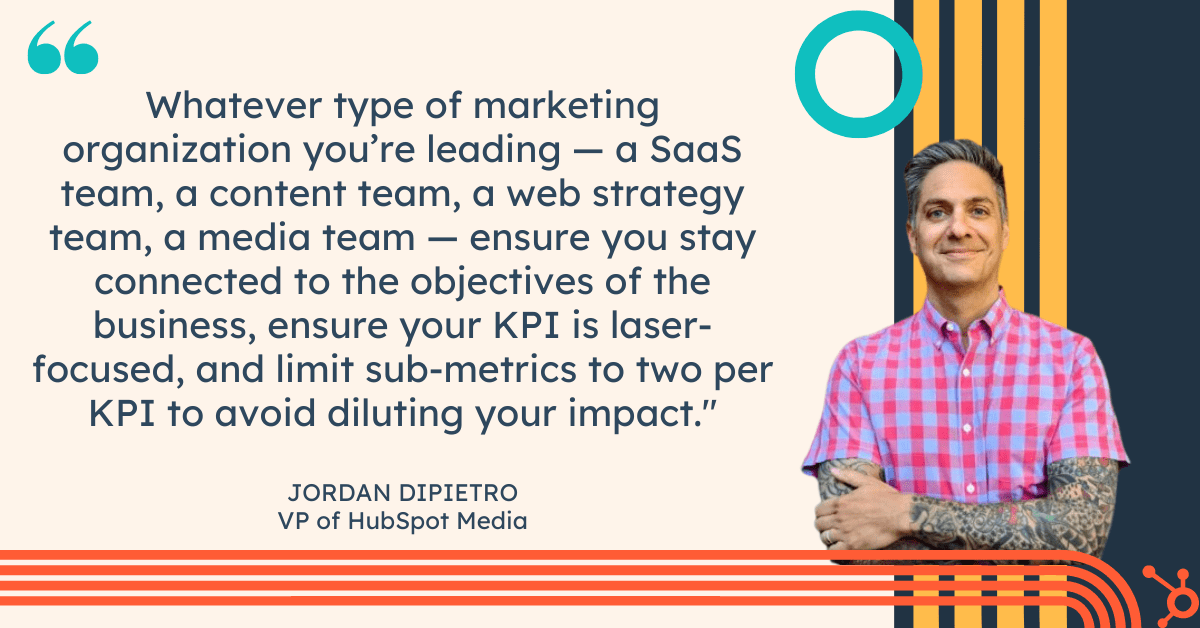
KPIs can vary greatly. For Robin Izsak-Tseng, G2’s VP of Revenue Marketing, leads and conversions matter most. She says marketers should track a blend of metrics, including MQL production, as an indicator of inbound interest. It’s equally critical that marketing leaders pay attention to SAL (sales-accepted leads), since that is another indication of lead quality.
ROI is another equally critical metric for many marketing leaders — and that importance is only growing. In fact, one-third (33%) of marketing executives, VPs, and directors say that using data to demonstrate the ROI and business value of their efforts became more important in 2022.
Jim Habig, VP of Marketing, LinkedIn Marketing Solutions, agrees that ROI is important … but it’s not the only metric that matters to him. He told me, “Let’s not discount the importance of other measures of long-range brand strength. With only 5% of buyers in-market at any given time, you need to ensure your brand creates pull for decision-makers now and in the future.”
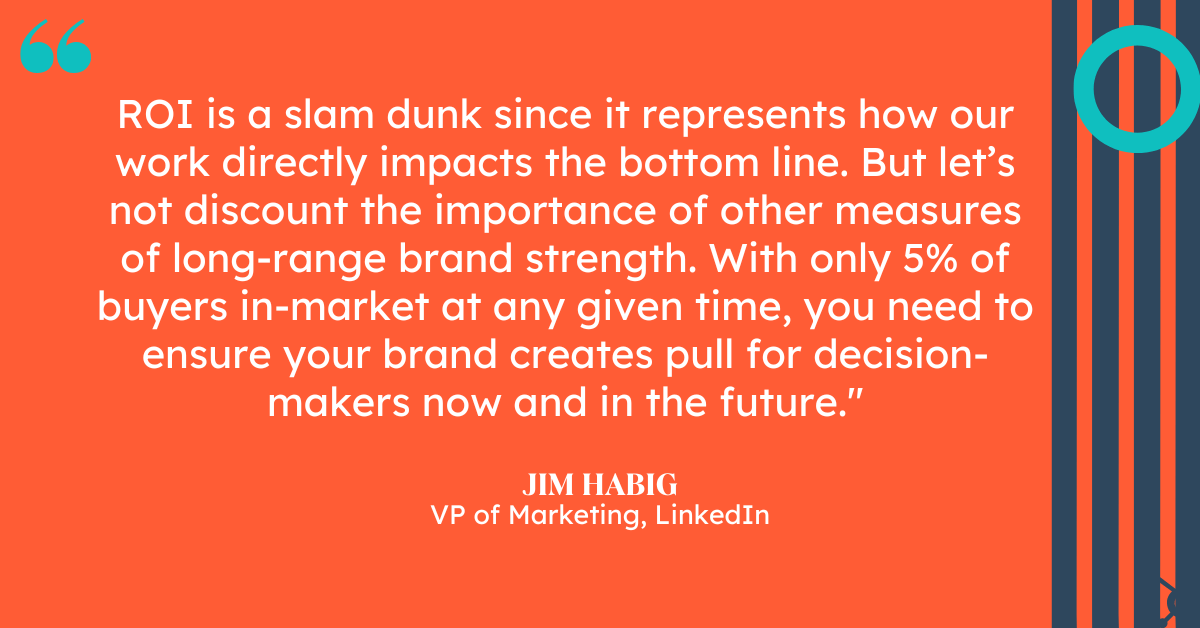
The data aligns with this. In our Executive Leadership survey, we found:
- 60% of marketing leaders say sales is one of the most important metrics to track when measuring the performance of your marketing activities (when allowed to select up to three).
- Sales is followed by customer retention (44%), ROI (43%), and brand awareness (43%) as the most important metrics to track.
- The top ten metrics that marketing leaders track to measure performance include: Sales (62%), customer retention (55%), return on marketing investment (47%), brand awareness (45%), web traffic (42%), customer testimonials (40%), customer acquisition (39%), organic traffic (38%), conversion rates (38%), and customer lifetime value (37%).
- Sales, leads, and conversion rates is the KPI the majority (49%) of marketing leaders use to assess the performance of their website.
How to Get Buy-In from Some of the Top Marketing Leaders: 3 Execs Discuss What KPIs Matter to Them
5. The most effective strategy for getting leadership buy-in is clearly demonstrating the impact adopting the new idea will make on achieving the company’s business goals.
Getting leadership buy-in isn’t easy, particularly when budgets are tight and marketing leaders’ need to be especially careful about where they spend money.
Which is why it makes sense that clearly demonstrating the impact adopting a new idea will make on achieving a company’s business goals is the number one most effective strategy marketing leaders’ reported for getting buy-in. In our survey, we found roughly one-third (31%) of marketing leaders believe it’s the most effective strategy.
A few other potentially effective strategies include:
- Clearly demonstrating the impact the new idea will have on other teams at the company, e.g. a tool that will improve sales/marketing alignment (29%).
- Demonstrating how the new idea aligns with company-wide goals/initiatives (25%).
- Providing examples/case studies of other companies who adopted the new idea successfully (24%).
- Demonstrating the challenges the new idea will help solve (23%).
- Demonstrating the opportunities the new idea presents (22%).
6. Leads, conversion rates, and total monthly visitors are the SEO metrics that matters most to marketing leaders.
SEO is an undeniably powerful strategy for audience growth, brand awareness, and increasing sales.
In fact, 43% of marketing directors, VPs, and C-suite executives reported SEO as one of the most effective strategies their companies currently leverage.
But there are so many SEO metrics that it can be difficult to determine which ones actually matter. Is it organic traffic? Conversions? Keyword rankings?
Our data uncovered these are the SEO metrics that matter most to marketing leaders when it comes to assessing the performance of their website:
- Sales, leads, and conversion rates (49%)
- Total monthly visitors (43%)
- Traffic from social media (40%)
- New vs. Returning visitors (39%)
- Click-through rate (38%)
It’s interesting to note — organic traffic or rankings on the SERPs don’t even hit the top five when it comes to important SEO metrics for marketing leaders.

Additionally, I spoke with Semrush’s VP of Brand Marketing, Olga Andrienko, to uncover the SEO metrics that she’d advise leaders pay attention to in 2023. Some of her tips include:
- Focus on the metrics that tie directly back to revenue — like conversions and new MRR.
- Don’t forget about branded keyword search volume.
- Consider click-through rate and how it correlates to organic traffic.
- Don’t ignore rankings, backlinks, domain authority, and user behavior metrics.
Which SEO Metrics Matter Most to Marketing Leaders, According to Semrush’s VP of Brand Marketing
7. A content strategist is the top role marketing leaders’ plan to hire in 2023.
When asked which role marketing leaders’ plan to recruit, 32% say ‘content strategist’ is their top priority in 2023 — followed by content marketing manager (23%).
This makes sense. A strong content creation strategy is one of the most effective marketing plays. As we enter the new year, many companies will need to hire strong content creators to ensure they’re continuing to create unique and compelling content for audiences that likely already feel overloaded. Additionally, many content creators will need to become adapt at shifting the types of content they create for various channels.
A content creator in 2023 might be tasked with creating a TikTok reel one day, then a blog post, and a YouTube video after that.
Additionally, 37% of marketing leaders say ‘a lack of qualified candidates’ is their biggest challenge in hiring right now. Marketers are expected to be increasingly skilled in niche areas such as TikTok, podcasting, or video creation, so the pool of qualified applicants becomes smaller as companies expect more from their candidates.
A few other highlights when it comes to hiring and promoting:
- 14% of marketing leaders say hiring top talent is the biggest challenge they expect to face in 2023.
- Leadership (39%), communication skills (33%), and problem-solving skills (33%), are the most important qualities & traits marketing leaders look for when promoting an IC to a senior position.
- Leadership skills (27%), a strong work ethic (23%), and communication skills (22%) are most important to marketing leaders when they’re considering promoting a people manager to a director+ position.
8. When promoting individual contributors, 24% of marketing leaders look at an IC’s ability to pivot their marketing strategy in response to major events (e.g. recession, pandemic, political turmoil).
If you’re hoping to get promoted as an individual contributor (IC), it’s important to know what marketing leaders’ look for when promoting an IC to a senior position.
These are the promotional factors that matter most to marketing leaders right now when it comes to ICs:
- 24% of marketing leaders’ are tied on three factors that matter most when promoting an IC: Their ability to pivot their marketing strategy in response to major events (e.g. recession, pandemic, political turmoil) or new opportunities; Their ability to strategically plan for both the short and long term; and expertise in their industry.
- 23% of marketing leaders care about an IC’s ability to keep up with and experiment with new platforms and features (e.g. BeReal, YouTube Shorts) when considering a promotion.
If you’re an IC who is looking to become a people manager, you’re in luck — we also asked marketing leaders’ what they look for when promoting an IC to a people manager, and 26% say they care most about an IC’s ability to build trust and rapport within their team. That’s followed by 25% who say they look for an IC’s ability to bring people together to solve problems.
On the people manager side, marketing leaders say that people managers can make the greatest impact in their roles by motivating and empowering their team (39%). That’s followed by helping their team exceed goals and expectations (32%) and helping their team exceed goals and expectations (31%).

As we segue into 2023, it makes sense that both individual contributors and people managers want to know how they can grow at their current companies.
If you’re an individual contributor and you’re hoping to get promoted in 2023, VP of Brand at Help Scout, Kristen Bryant Smith, told me a few factors that could help you stand out. These include:
- The ability to tell stories to express the level of impact you’re having on the team.
- Being a cross-department translator — in other words, being someone who adds contextual knowledge and listens to others across the business.
- Being able to set realistic goals and hit them.
- Being consistent.
Alternatively, perhaps you’re a people manager and you’re looking to get promoted to a director-level. As you a people manager hoping to get promoted, Smith says you’ll stand out if you demonstrate:
- An ability to navigate ambiguity and translate it effectively.
- Providing role clarity to each of your direct reports.
- Thinking on longer timelines.
- Demonstrating empathy.
Thinking on longer timelines, and being able to strategically plan for the long and short-term, is supported by the data. 25% of marketing leaders say it’s the most important factor they look at when considering promoting a people manager, along with their ability to set clear goals and expectations for their team (24%).
What Help Scout’s VP of Brand Considers When Promoting Individual Contributors & People Managers [+ How These Promotions Differ]
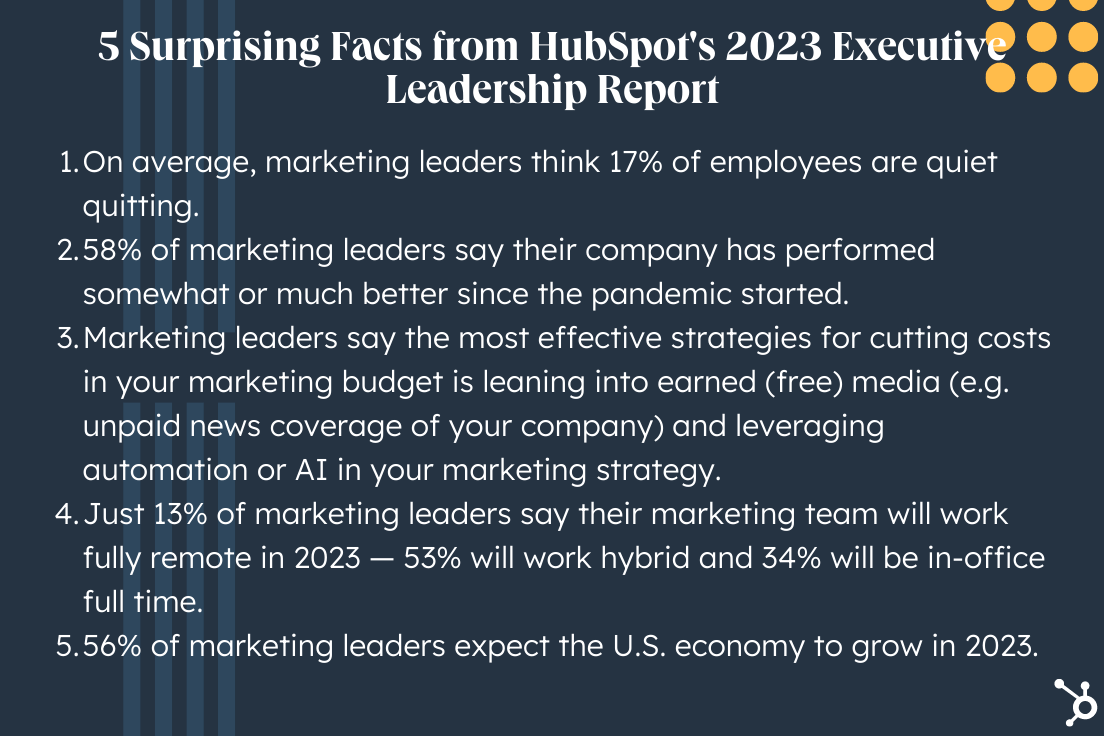
Other Surprising Findings
- On average, marketing leaders think 17% of employees are quiet quitting (which is when employees intentionally do the bare minimum required of them in their role).
- 29% of marketing leaders strongly agree that the quality of an employee’s relationship with their direct supervisor is the most important factor in determining whether they engage in quiet quitting.
- 77% of marketing leaders agree that it’s the responsibility of the leadership team to prevent quiet quitting.
- Marketing leaders are optimistic going into 2023, with 78% expecting their company to perform better than in 2022.
- 58% of marketing leaders say their company has performed somewhat or much better since the pandemic started.
- Marketing leaders report social media marketing to be a critical skill marketers’ should focus on for career growth, with 26% marking it as a top skill they look for when hiring.
- On average, marketing leaders say 33% of their overall company budget goes towards marketing.
- Marketing leaders say the most effective strategies for cutting costs in your marketing budget is leaning into earned (free) media (e.g. unpaid news coverage of your company) and leveraging automation or AI in your marketing strategy.
- 56% of marketing leaders expect the U.S. economy to grow in 2023.
- 80% of marketing leaders have taken steps to plan or prepare for an economic slowdown or recession.
- Marketing leaders say the most effective strategies during an economic slowdown or recession are focusing your marketing efforts on existing customers and adapting your messaging to empathize with what your audience is experiencing.
- Marketing leaders say healthy work-life balance is the most important aspect of company culture for marketers to succeed.
- Marketing leaders say unsupportive management is the aspect of company culture most likely to negatively impact marketers ability to succeed in their roles.
- Just 13% of marketing leaders say their marketing team will work fully remote in 2023. 53% will work hybrid and 34% will be in-office full time.
- 36% of marketing leaders say the best way for marketers to get visibility with their leadership team is by stepping into leadership opportunities (e.g. leading a newly created committee, volunteering to present research findings at a company-wide meeting).
- The majority of marketing leaders (53%) say their team’s reliance on third-party data didn’t change in 2022, and 46% don’t believe it will change in 2023, either. Similarly, 52% of marketing leaders say their team’s reliance on first-party data didn’t change in 2022, and 44% don’t expect it to change in 2023, either.
- 74% of marketing leaders say consumers should be directly compensated for sharing their personal data with companies.
More Data and Insights
- The Top Challenges Marketing Leaders Expect to Face in 2023 & How You Can Solve For Them [Expert Insights & Data]
- The Top Goals of Marketing Leaders in 2023 [New Data + Expert Insights from Uber, Dropbox, and ClickUp]
- How to Get Buy-In from Some of the Top Marketing Leaders: 3 Execs Discuss What KPIs Matter to Them
- What Help Scout’s VP of Brand Considers When Promoting Individual Contributors & People Managers [+ How These Promotions Differ]
- Which SEO Metrics Matter Most, According to Semrush’s VP of Brand Marketing
![]()

